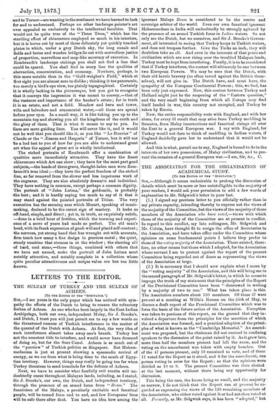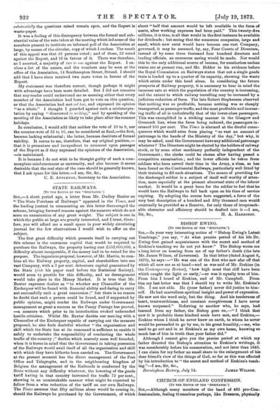THE ASSOCIATION FOR THE ORGANISATION OF ACADEMICAL STUDY.
[TO THE EDITOIL OF THE "SPECTATOR.")
Sm., —Although it seems undesirable to prolong the discussion of details which must be more or less unintelligible to the majority of your readers, I would ask your permission to add a few words of explanation to Mr. Sidgwick's letter in your last.
(1.) I signed my previous letter to you officially rather than in my private capacity, intending thereby to express not the views of the majority of the Committee, but the views of the majority of those members of the Association who have voted,—views with which those of the majority of the Committee are at present in conflict. In regard to this conflict, my late colleagues, Mr. Sidgwick and Mr. Colvin, have thought fit to resign the office of Secretaries to the Association, and have taken office under the Committee whose opinions on some fundamental points I believe they prefer to those of the voting majority of the Association. There existed, there- fore, no other means but those which I adopted, for the Association whose servant I am to protest against the report of the present Committee being regarded out of doors as representing the views of the Association at large.
(2.) It is necessary that I should now explain what I mean by the "voting majority" of the Association, and this will bring me to the second paragraph of Mr. Sidg wick's letter, in which he seems to impugn the truth of my statement that the principles of the Report of the Provisional Committee have been "disavowed in writing by a majority of two to one." What has taken place is this. The Association numbers about 130 members. Of these 47 were present at a meeting at Willis's Rooms on the 24th of May, to discuss a draft report of the Provisional Committee which was to form the basis of the future action of the Association. Exception was taken to portions of this report, on the ground that they in- volved a departure from the principles for the assertion of which the Association was formed, and a practical adoption of the princi- ples of what is known as the "Cambridge Memorial." An amend- ment was proposed, but the chairman did not succeed in confining speakers to the discussion of the point raised by it. As it grew late, more than half the members present had left the room, and the voting on the amendment was taken with empty benches. Out of the 47 persons present, only 19 remained to vote, and of these 11 voted for the Report as it stood, and 8 for the amendment, one person voting in error for the Report : so that the opinions were divided as 10 to 9. The present Committee was then elected at the last moment, without there being any opportunity for discussion.
This being the case, the house being so small, and the majority so narrow, I do not think that the Report can at present be re- garded as expressing the views of the 120 remaining members of the Association, who either voted against it or had not then voted at all. Formally, as Mr. Sidgwick says, it has been "adopted," but substantially the questions raised remain open, and the Report is waste-paper.
It was a feeling of this discrepancy between the formal and sub- stantial value of the vote taken at the meeting which led some of the members present to institute an informal poll of the Association at large, by means of the circular, copy of which I enclose. The result of this appeal was that 48 persons voted ; and of these, 32 voted against the Report, and 16 in favour of it. There was therefore, as I asserted, a majority of two to one against the Report. I en- close a list of the names, and the vouchers may be seen at the office of the Association, 14 Southampton Street, Strand. 1 should add that I have since received two more votes in favour of the Report.
My statement was therefore correct, though perhaps it might with advantage have been more detailed. But I did not conceive that any reader could understand me as meaning either that every member of the Association had been got to vote on this question, or that the Association had met ad hoc, and expressed its opinion "as a whole." I thought I guarded against such a misinterpre- tation by saying "disavowed in writing," and by speaking of the meeting of the Association as likely to take place after the summer holidays.
In conclusion, I would add that neither the vote of 10 to 9, nor the counter-vote of 32 to 16, can be considered as final,—the first, because lacking substantial ; the latter, because destitute of formal validity. It seems to me, therefore, that my original position,— that it is premature and inexpedient to comment upon passages of the Report as if they expressed the opinions of the Association, —is maintained.
It is because I do not wish to be thought guilty of such a com- monplace misd emeanour as unveracity, and also because it seems desirable that the real state of the case should be generally known, that I ask space for this letter.—I am, Sir, &c., C. E. Arermros, Secretary to the Association.



































 Previous page
Previous page